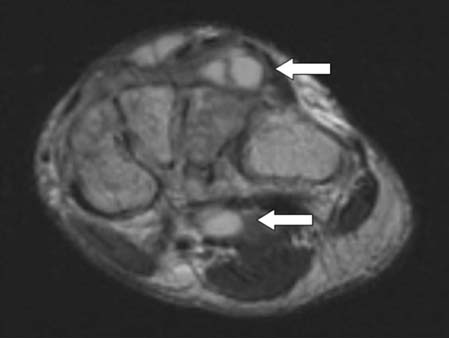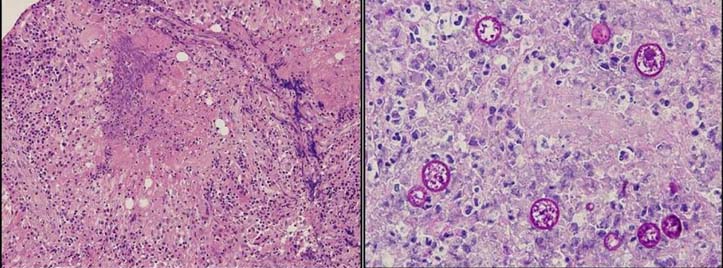Infect Chemother.
2009 Aug;41(4):253-257. 10.3947/ic.2009.41.4.253.
Recurrent Coccidioidomycosis Manifesting as Osteomyelitis in Korea
- Affiliations
-
- 1Department of Internal Medicine, Yonsei University College of Medicine, Seoul, Korea. jmkim@yuhs.ac
- 2Department of Pathology, Yonsei University College of Medicine, Seoul, Korea.
- KMID: 1473678
- DOI: http://doi.org/10.3947/ic.2009.41.4.253
Abstract
- Coccidioidomycosis is a fungal infection that results from inhaling the airborne arthroconidia of the Coccidioides species. It is an endemic disease in the southwest part of North America and rarely diagnosed in Korea. As tourism to endemic areas and the number of immunocompromised patients have been increasing, the incidence of this infection has increased in non-endemic areas. Treatment is usually successful with antifungal agents; however, recurrence is common. It is difficult to decide when to discontinue the antifungal treatment especially in non-endemic areas where doctors are not familiar with the disease. We report a case of recurrent coccidioidomycosis manifesting as osteomyelitis after the treatment of the patient for disseminated coccidioidal infection. The complement fixation test was a useful tool for the assessment of patient response and to evaluate suspected recurrence.
MeSH Terms
Figure
Cited by 1 articles
-
A Case of Coccidioidal Meningitis
Jung Woo Lee, Sang Il Kim, Youn Jeong Kim, Jae-Cheol Kwon, Ye Jee Lim, Mi Hee Park, Seon A Kim, Eun Sil Koh, Min Ju Kim, Moon Won Kang
Infect Chemother. 2012;44(2):75-79. doi: 10.3947/ic.2012.44.2.75.
Reference
-
1. Galgiani JN. Coccidioidomycosis: a regional disease of national importance. rethinking approaches for control. Ann Intern Med. 1999. 130:293–300.
Article2. Spinello IM, Munoz A, Johnson RH. Pulmonary coccidioidomycosis. Semin Respir Crit Care Med. 2008. 29:166–173.
Article3. Anstead GM, Graybill JR. Coccidioidomycosis. Infect Dis Clin North Am. 2006. 20:621–643.
Article4. Galgiani JN, Ampel NM, Blair JE, Catanzaro A, Johnson RH, Stevens DA, Williams PL. Infectious Diseases Society of America. Coccidioidomycosis. Clin Infect Dis. 2005. 41:1217–1223.
Article5. Kim JH, Hur GY, Jung KH, Jung HC, Park DW, Lee SY, Lee SY, Kim JH, Shon JU, Shin C, Shim JJ, In KH, Kang KH, Yoo SH. Disseminated coccidioidomycosis presenting with miliary nodules. Tuberc Respir Dis. 2006. 60:97–101.
Article6. Park JC, Kim JH, Ku NS, Lee KH, Choi YK, Lee YH, Kim YK, Kim MS, Song YG, Shin SY, Kim YA, Park YS, Cho SH, Kim CK, Yong D, Choi JY, Kim JM. A case of disseminated coccidioidomycosis with pelvic bone and paravertebral abscess. Infect Chemother. 2006. 38:296–299.7. Sinn DH, Kwon YS, Choi SY, Chang WI, Park MK, Han J, Chung MP. A case of pulmonary coccidioidomycosis mimicking lung cancer. Korean J Med. 2005. 69:419–423.8. Kim JH, Kim MA, Yang SK, Choi TY, Kim CW, Kim KH. A Case of coccidioidomycosis. Korean J Dermatol. 1976. 14:73–79.9. Drutz DJ, Catanzaro A. Coccidioidomycosis. Part I. Am Rev Respir Dis. 1978. 117:559–585.10. Saubolle MA. Laboratory aspects in the diagnosis of coccidioidomycosis. Ann N Y Acad Sci. 2007. 1111:301–314.
Article11. Johnson RH, Einstein HE. Amphotericin B and coccidioidomycosis. Ann N Y Acad Sci. 2007. 1111:434–441.
Article12. Sandoval JJ, Shank JR, Morgan SJ, Agudelo JF, Price CS. Midfoot coccidioidal osteomyelitis. A case report and review of the literature. J Bone Joint Surg Am. 2006. 88:861–865.
Article13. Catanzaro A, Galgiani JN, Levine BE, Sharkey-Mathis PK, Fierer J, Stevens DA, Chapman SW, Cloud G. NIAID Mycoses Study Group. Fluconazole in the treatment of chronic pulmonary and nonmeningeal disseminated coccidioidomycosis. Am J Med. 1995. 98:249–256.
Article14. Diaz M, Puente R, de Hoyos LA, Cruz S. Itraconazole in the treatment of coccidioidomycosis. Chest. 1991. 100:682–684.
Article15. Parish JM, Blair JE. Coccidioidomycosis. Mayo Clin Proc. 2008. 83:343–349.
Article16. Yeo SF, Wong B. Current status of nonculture methods for diagnosis of invasive fungal infections. Clin Microbiol Rev. 2002. 15:465–484.
Article17. Pappagianis D, Zimmer BL. Serology of coccidioidomycosis. Clin Microbial Rev. 1990. 3:247–268.
Article18. Oldfield EC 3rd, Bone WD, Martin CR, Gray GC, Olson P, Schillaci RF. Prediction of relapse after treatment of coccidioidomycosis. Clin Infect Dis. 1997. 25:1205–1210.
Article19. Bissell SR, Weiss EC. Centers for Disease Control and Prevention (CDC). Increase in coccidioidomycosis - California, 2000-2007. MMWR Morb Mortal Wkly Rep. 2009. 58:105–109.20. Centers for Disease Control and Prevention (CDC). Increase in coccidioidomycosis--Arizona, 1998- 2001. MMWR Morb Mortal Wkly Rep. 2003. 52:109–112.



